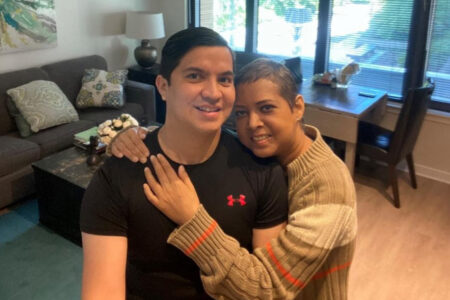It has been a long five-year battle for 38-year-old Marla. Marla has traveled nearly 3,000 miles from Ecuador to the NIH in order to receive treatment for diffuse large B cell lymphoma, a type of Non-Hodgkin’s lymphoma.
Marla was attending medical school in 2015 to become an OB-GYN when she noticed that she was experiencing a cough and shortness of breath that would not go away. She went to the doctor to get an X-ray, and doctors found an 8 by 4 centimeter lump in Marla’s chest. She was diagnosed with lymphoma and was told that if she didn’t immediately start treatment, she would die.
Marla received treatment in Quito, Ecuador, which included eight months of chemotherapy and fifteen sessions of radiation. After this, she was in remission for a year and a half. Even with all of her health problems, Marla was able to complete medical school and begin practicing as an OB-GYN.
But Marla noticed something was wrong again. She noticed a lump near her left armpit in 2018. After a biopsy, doctors confirmed that she had diffuse large B-cell lymphoma. Marla began treatment in her hometown of Guayaquil. After a year of treatments, doctors told her that her cancer was still advancing and she needed to find therapy outside of Ecuador.
“If not, I was told I only had two months to live,” Marla says. With no more options left for her in Ecuador, Marla’s doctor connected her to the NIH, and she had her first appointment in February 2019. Marla says her first treatment protocol at the NIH helped to reduce her illness “about 70 percent,” but she still had many complications. In November 2019, Marla received a bone marrow transplant from her sister, which was successful, but she has faced complications during her recovery. This has led to many stays in the ICU and dialysis.
Marla’s condition is slowly improving, but she is not well enough to go back to Ecuador yet. She and her fiancé needed a place to stay to continue treatment, but rent near the NIH campus is very expensive.
If not, I was told I only had two months to live.
Friends of Patients at the NIH was able to provide Marla and her fiancé the use of one of our apartments near the NIH campus. “This has been a huge assistance and help because I don’t have a lot of family here in the United States,” Marla says. “I don’t have the resources to be able to support myself here.”
Marla’s fiancé, Juan-Francisco, says that he is thankful for the apartment’s convenience. Marla has to go to the NIH twice a week for treatment, so the close proximity to the NIH’s campus makes this easier for them.
Marla hopes that she can go back to work as an OB-GYN soon, as she did not have much time to work in her field before her cancer diagnosis.
To our donors, Marla says, “It’s important for them to know that the help that they provide is important for the people that really need it, especially in a moment that is such a hard moment for us.”
It has been a long fight for Marla. To be able to provide her with a place to live free of charge, can make her extremely difficult situation a little more bearable.
Please, consider donating today to help patients like Marla in their time of need.
* Patient name changed for privacy





